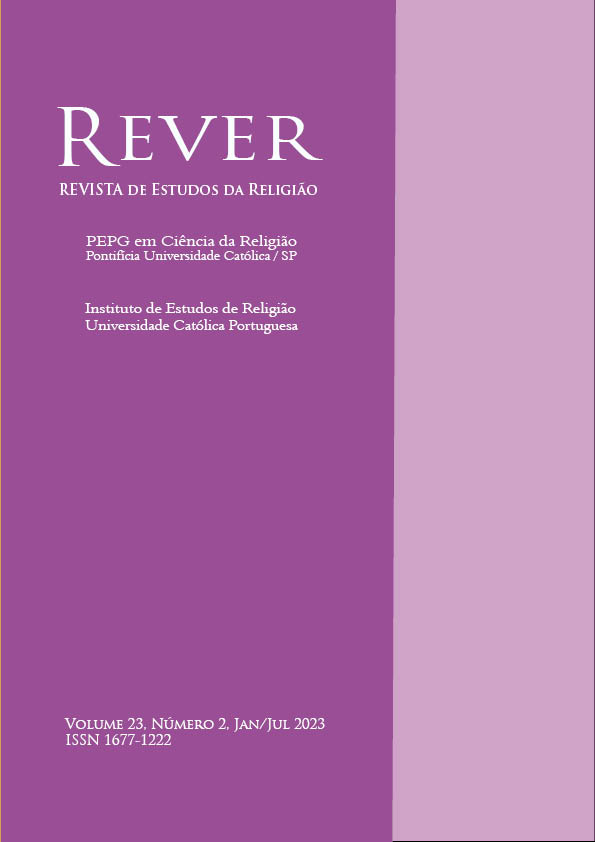From Democritus and Isaac to Jesus Christ
The laughter in the construction of the Christian’s God
DOI:
https://doi.org/10.23925/1677-1222.2023vol23i1a2Keywords:
Democritus, Isaac, Jesus, Laughter, Christology, Heresy/orthodoxyAbstract
We revisit, starting with the Patristic sources, the quaestio disputata of the laughter (or not laughter) of Jesus, in order to establish the role of laughter in the representation of the God of the Christians. In a reaction against the old theologia mythica, the mythology (with the “inexhaustible laughter” of the gods), the Fathers of the Church substantially redefined the status of laughter and humor in Christian life and spirituality. They did so from the exemplum o Jesus and the silences of the Gospels, but also reusing laughter as a border between orthodoxy and heterodoxy in the definition of Christology itself. Knowing that the Christ of the Gnostics, like the pagan divinities, laughs much more than the Jesus Christ of the Gospels and of ecclesiastical doctrine, we are interested in establishing how laughter (human or divine?) was used in the elaboration of the diverse Christologies: in a constant tension between the Docetic tendencies that affirm the laughter of Jesus in order to negate his humanity and highlight the otherness of the man Jesus in contrast with the divine Christ (Gnosticism) and the “Catholic” reading that denies the historical Jesus the laughter “proper to man”, with the consequent risk of diminishing the real humanity of Christ, which is however underscored in the “tears” and the drama of the Passio.
References
ALMEIDA, Abílio. História do riso, Lisboa: Guerra e paz 2022.
ARNOULD, Dominique. Le rire et les larmes dans la littérature grecque d’Homère à Platon (Paris: Les Belles Letres 1990).
BACONSKY, Teodor. Le rire des Pères. Essais sur le rire dans la patristique grecque, Paris: Desclée de Brouwer, 1996.
BEARD, Mary. Ridere nell’antica Roma, Roma: Carocci editore, 2014.
BETTINI, M. – RAVERI, M. – REMOTTI, F. Ridere degli dèi, ridere com gli dèi, Bologna: Il Mulino 2020.
ECO, Umberto. O nome da rosa, Lisboa: Difel 1980.
JAEGER, Werner. La teologia dei primi pensatori greci, Firenze: Paideia, 1961.
JEANSON, Francis. Signification humanin du rire, Paris: Editions Du Seuil, 1950.
MAZZUCCO, Clementina. Riso e comicità nel cristianesimo antico. Atti del Convegno (Torino, 14-16 febbraio 2005), Alessandria: Edizioni dell’Orso, 2007.
MINOIS, Georges. História do riso e do escárnio, São Paulo: Editora Unesp, 2003.
NASCIMENTO, Aires A. O riso do homem medieval, in NUNES, E. – BARROS DIAS, I., – REFFÓIOS, M. O riso. Teorização. Leituras. Realizações, Casal de Cambra: Caleidoscópio 2015, 13-43.
NOVEMBRI, Valeria. Gregorio e la fisionomia del riso, in MAZZUCCO, C., Riso e comicità nel cristianesimo antico. Atti del Convegno (Torino, 14-16 febbraio 2005), Alessandria: Edizioni dell’Orso, 2007).
ORBE, Antonio. Cristologia gnóstica, II (Madrid: BAC 1977).
REMOTTI, Francesco. L’umorismo teológico. Un’introduzione, in BETTINI, M. – RAVERI, M. – REMOTTI, Francesco. Ridere degli dèi, ridere con gli dèi, Bologna: Il Mulino 2020.
RICOZZI, Giuliana. Gli dèi, il riso e il comico: la rappresentazione del divino nelle fonti litterarie in lingua greca, 2020. https://tel.archives-ouvertes.fr/tel-02637225 (acedido a 11712/2022).
RIZZERIO, Laura. Les chrétiens et le rire. La voie médiane de Clément d’Alexandrie, in NRT 138 (2016).
RUDHART, Jean. Rires et sourires divins. Essai sur la sensibilité religieuse des grecs et des premiers chrétiens, in Revue de Théologie et de Philosophie 124 (1992).
STROUMSA, Guy. Il riso di Cristo, Brescia: Paideia 2014.
TRÉDÉ, Monique – HOFFMANN, Ph. Le rire des anciens. Actes du colloque international, Université de Rouen, Ecole Normale Supérieure, 1995.
Downloads
Published
How to Cite
Issue
Section
License

This work is licensed under a Creative Commons Attribution-NonCommercial 4.0 International License.
Authors who publish in this journal agree with the following terms:- Authors retain copyright, but grant the journal the right of first publication, with the work simultaneously licensed under the Creative Commons BY-NC License.
- Authors are authorized to assume additional contracts separately, for non-exclusive distribution of the work published in this journal (e.g., publishing in an institutional repository or as a book chapter), as long as with acknowledgment of authorship and first publication in this journal.


